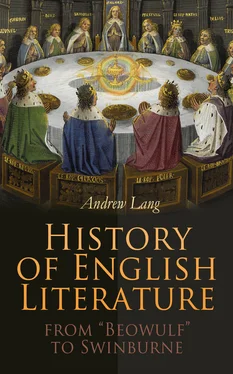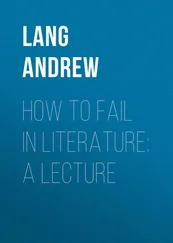The first sacred poet of whom we hear is Cædmon. His tale is told by the great and learned Bede, born at Wearmouth in Northumberland in 673, and trained in the new monastery there. Says Bede: "There was in the monastery of St. Hilda at Whitby, a Brother who, when he heard the Scriptures interpreted, could instantly turn the lesson into sweet verses." Just so the minstrel of Hrothgar, when he heard the nobles talk about Beowulf's defeat of Grendel, turned the story at once into a song. This was "improvisation," and Cædmon "improvised" religious poems; no man has equalled them since, says Bede. But he began when he was far from young, and was not yet a priest. Till then he had not been a poet; indeed, if he were at a feast where every man sang in his turn, when the harp was brought to people near him at table, he arose and went home.
One night he ran away from the harp into the stalls of the cattle, and there fell asleep on the straw. In a dream One appeared to him, and bade him sing. He answered that he had left the feast because he could not sing.
"You must sing."
"About what am I to sing?"
"The beginning of things created."
Cædmon then made in his sleep a poem about the Creation, and when he awoke he remembered it, as Coleridge made "Kubla Khan" in a dream, and remembered part of it until he was disturbed by a person on business from Porlock. After this Cædmon made sacred poems, doing Scripture into verse, with perfect ease, and he became a monk.
Now there exist long Anglo-Saxon poems on parts of Genesis, Exodus, and Daniel, and it has been very naturally supposed that these are the poems of Cædmon, which, as Bede thought, had never been equalled in the Anglian tongue. Nothing is known for certain, and only one short hymn has a good chance to be by the poet Cædmon. The ideas of the poet singing of the war in Heaven, so closely resemble those of Milton, in "Paradise Lost," that Milton has been supposed to have known something of the Anglo-Saxon poem. 1No lines in "Paradise Lost," are more familiar than those which describe a land of fire,
Yet from these flames,
No light, but rather darkness visible,
Served only to discover sights of woe.
The old Anglo-Saxon poet says:—
They sought another land,
That was devoid of light,
And was full of flame.
The speech of Satan, too, in Anglo-Saxon, the speech in which he blames the justice of God; his threat of what he would do, were he free for but one winter; his design to avenge himself on Adam and his posterity, are all like Milton, whose
Fairest of her daughters, Eve,
is exactly like
The fairest of women,
That have come into the world.
In the fighting scenes of these Anglo-Saxon Biblical poems, the poets appear to enjoy themselves most and to feel most at home. They have only to write in the manner of their own old battle songs, about the howling of wolves and crying of ravens to whom the victor gives their meat.
Indeed Anglo-Saxon poetry reminds us of an ancient casket of whalebone in the British Museum, with its scenes from the heathen story of Weland or Weyland Smith, the adoration of the Magi, Romulus and Remus and the wolf, and a battle between Titus and the Jews: such is the mixture of Christianity, heathenism, and learning in the Christian Anglo-Saxon literature. 2
Thus in the long fragment "Judith," based on the well-known story of Judith and Holofernes in the Apocrypha, there is vigour in the descriptions of the intoxicated roaring Holofernes; and of the cries of wolf, raven, and eagle; and of the clash of swords and shields.
The best Christian poem, called "Crist," is full of the happiness bestowed by the new religion. The verses are by a poet named Cynewulf of whom nothing is known but his name, recorded in a kind of acrostic written in the Runic alphabet. He took his matter from sermons and hymns in Latin, but Cynewulf makes the poetry his own. He is joyously religious. After all the melancholy of the heathen or half-heathen minstrels, their wistful doubts about the meaning and value of our little life, the author of the "Crist" comes as one who "has seen a great light". He rejoices like the shepherds who heard good tidings of great joy at Bethlehem on the first Christmas night. It is as when spring comes to the world and the thrushes cannot have enough of singing: the night and the darkness are over: the grave has lost its sting and Death his victory. The poet is as happy as the birds in March. To him the message of Christ is no old story, but a new certainty; he has no doubt, no fear, and this gladness of faith is all his own, whether he sings of Our Lord or of Our Lady. That is the charm of Cynewulf; his fresh delight in his work.
Thou to us
The bright sun sendest,
And thyself comest,
That thou may'st enlighten
Those who long ago
With vapour covered,
And in darkness here
Sat, in continual night.
The legends of "St. Guthlac" and "St. Juliana," on the other hand, are not, it must be confessed, such spontaneous bursts of song.
In the "Andreas" the poet, whoever he was, sings of what he has heard, adventures of St. Andrew and St. Mark. St. Matthew has fallen into the hands of the cannibals of old Greek legend, the Læstrygonians, the poet calls them the "Mermedonians". 3
The cannibals have caught, and are about to eat St. Matthew, but the Lord appears first to him, in his dungeon, and then to St. Andrew, who is living among the Achæans, in Greece. The voyage, the fighting, are in the old heathen style, and the Deity appears with two angels, all three disguised as sailors. It is impossible to give the whole tale, which appealed to the natural man as a great story of adventure in waves and war, while it introduced religion. The adventures are many, and much more startling and wild than any that survive from the Anglo-Saxon poetry of heathen times.
There is a singular poem "The Dream of the Rood," which with many other "masterless" poems, some critics assign to Cynewulf, on account of the style, and the deep personal feeling which we admire in the "Crist": others attribute it to Cædmon. This opinion was partly based on a curious set of facts. The followers of the great Reformer, John Knox, in Scotland (1560) destroyed almost all the "monuments of idolatry" as they called works of Christian art. But they forgot to break to powder a tall ancient cross of red sandstone, beautifully carved, and marked with Runic characters, in the church of Ruthwell, near Dumfries. Some eighty years later (1642) when the Covenanters were in arms against Charles I, the preachers began a new war against works of Christian art, and ordered the Ruthwell Cross to be destroyed. It was broken into several fragments, which have now been pieced together, and the Cross stands in an apse-shaped building adjoining the church. The Runic characters record a part of the poem styled "The Dream of the Rood," and give the inscription " Cædmon me made" , probably Cædmon was really the artist who made and carved the stone cross: indeed the name is rather hard to read.
The poem speaks of the author's wonderful dream of the gold adorned and jewelled True Cross, and, in "Elene," Cynewulf also speaks of the revelation to him of the light of the Truth of the Cross. Conceivably, then, Cynewulf really had a dream or vision, and became devout after a life of war and minstrelsy.
It would, in that case, be in old age that Cynewulf wrote, in the "Elene," a poetic version of the legend of the discovery of the True Cross by Helena, mother of the Emperor Constantine. This poem, probably based on a Latin legend, has been very highly praised. But before we can take any pleasure in it, we must try to think ourselves back into the state of mind of England when the heathen poetry of war was still popular, and Christianity, with many mediaeval legends, was a fresh inspiration. Even when we have done that as well as we can, the "Elene" awakens only an historical kind of rapture. The natural man is much more at home with "Beowulf" and "Waldhere" than with "Elene".
Читать дальше












